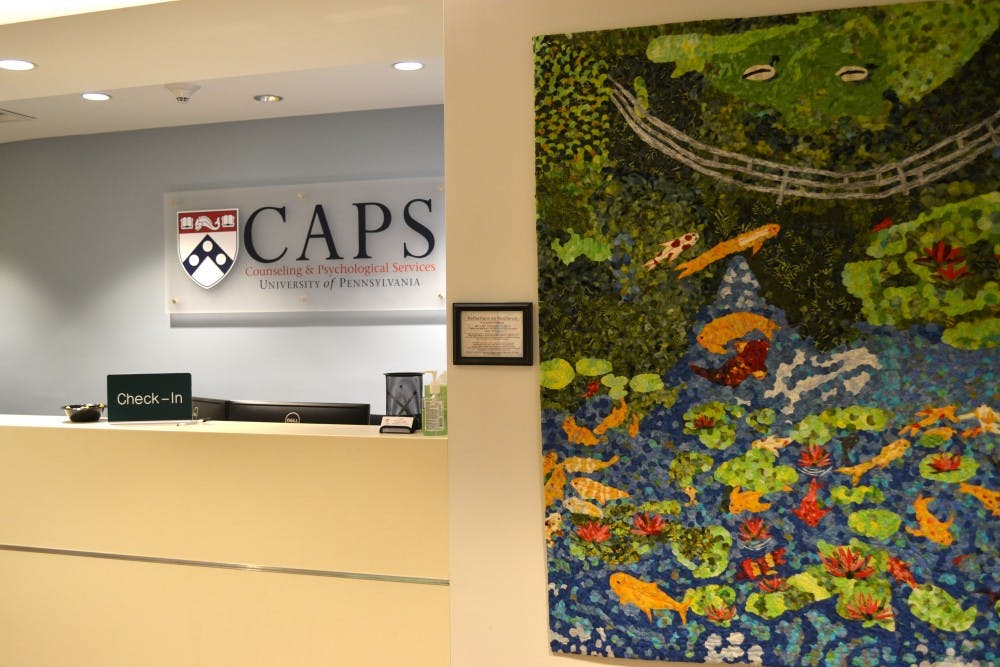
It only takes a few days on Penn's campus before you hear rumors from new friends or see a meme in a Facebook group about the poor quality of care from Penn's Counseling and Psychological Services and its lack of funding. Wait times for appointments are long. The CAPS office is far from campus. And, seriously, Wharton is getting its own private counselor?
While the goal of these messages might be to improve the quality and accessibility of Penn’s mental health resources, when students are looking for help they can be discouraging to hear.
Eventually, you might conclude that there’s no point in even going.
Despite what you may have seen or heard, CAPS has significantly improved in recent years. Funding for CAPS increased by 24 percent between the fiscal years of 2013 and 2016. In early 2017, four therapists were added to staff and CAPS hours were extended. Following the first Campus Conversation about mental health at Penn in October 2017, five staff members were hired, including three full-time clinicians. CAPS also has plans to move to a larger location or set up a satellite office closer to the center of campus to accommodate its increased staff.
CAPS not only offers individual and group counseling and psychological testing, but also a variety of other services that extend beyond business hours. As of last semester, clinicians are available 24/7 over the phone. It also houses the Sexual Trauma Treatment Outreach and Prevention team, composed of clinicians who provide confidential support and advocacy to students who have experienced sexual trauma. CAPS provides specialized treatment in a variety of domains, including clinicians for those who experience body dysmorphia or eating disorders and multilingual counseling in English, Mandarin, Cantonese, and Spanish.
While CAPS is most commonly known for offering treatment for mental health disorders, it also is designed to serve as a student resource for “personal problems, situational crises, and academic stresses” that are bound to come up while at school. Going to CAPS is more common than you may think: nearly a quarter of the undergraduate student body has been treated at CAPS at some point during their time at Penn.
That being said, it’s possible that CAPS services aren’t the right fit for you. Its 15 minute initial consultation requires you to open up to a clinician about personal information and struggles you may be having — this can be uncomfortable. Depending on your situation, CAPS clinicians may recommend you an external referral for longer-term care.
There are other on-campus organizations dedicated to assisting in mental wellness if you do find that CAPS is not an option for you — we encourage you to explore these opportunities. If you feel more comfortable with peer counseling, Penn Benjamins offers in-person peer counseling, and the Reach-A-Peer Helpline offers counseling through phone and text.

Other groups include Active Minds, which promotes conversations on mental health at Penn, Project HEAL, which aims to support those with eating disorders, CAPS Student Advisory Board, which works directly with CAPS leadership in order to destigmatize mental health on campus and implement initiatives at CAPS, Hillel Wellness, and CogWell@Penn. Cultural resource centers such as the Greenfield Intercultural Center, the LGBT Center, and the Penn Women's Center also act as support systems for students.
Finally, we believe it is important to address the largely negative coverage of CAPS in The Daily Pennsylvanian, 34th Street Magazine, and Under the Button. While we acknowledge our contributions to the stigma surrounding CAPS, we believe it is absolutely necessary to draw attention to Penn’s institutional flaws and call for change. Still, we realize how our words and their context can affect our readers.
Penn can be overwhelming, and it’s often difficult to ask for help. But it is important that you aren’t discouraged from making use of confidential, free, and often incredibly helpful resources the University has made available to you, regardless of their shortcomings.
Editorials represent the majority view of members of The Daily Pennsylvanian, Inc. Editorial Board, which meets regularly to discuss issues relevant to Penn's campus. Participants in these meetings are not involved in the reporting of articles on related topics.
CAMPUS RESOURCES
The HELP Line: 215-898-HELP
Counseling and Psychological Services: 215-898-7021 (active 24/7)
Student Health Service: 215-746-3535
Office of the Vice Provost for University Life: 215-898-6081
University Chaplain’s Office: 215-898-8456
Reach-A-Peer Helpline
- 215-573-2727 (every day from 9 p.m. to 1 a.m.)
- 215-515-7332 (texting service available 24/7)
Penn Benjamins (in-person peer counseling)
- Su, M, T 8-11 p.m. Harnwell Library First Floor
- W, Tr 8-11 p.m. Houston Hall Chaplains Office
The Daily Pennsylvanian is an independent, student-run newspaper. Please consider making a donation to support the coverage that shapes the University. Your generosity ensures a future of strong journalism at Penn.
Donate







